Dave Menary’s earliest sports memories are of playing baseball under coach John Riddell, but he also spent his winters playing hockey. He pursued his love of sports through his school years, playing a variety of sports at St. Andrews Senior Public School and at Southwood Secondary School, including basketball, volleyball, track and field and football.
“Sports was a big part of my school life,” said Menary. “I probably spent too much time playing various sports, but I couldn’t help it as I loved the competition. I did manage to make the honour roll when it counted, which was important to gain university admission.”
As someone pointed out later, there was one sport he did not play: cricket.
He also took part in the first-ever Can-Amera Games, in 1972, playing volleyball with a core group of guys that continued to play with the YMCA team.
“Can-Amera became almost a lifelong activity,” he recalls. “It was incredible.” He was a longtime member of the Can-Amera board.
He also played on the YMCA inter-club volleyball team while in high school, winning an Ontario YMCA championship.
For the next decade, he played Can-Amera volleyball, before a shoulder injury when playing varsity volleyball at university forced him to begin coaching.

But that injury began a chain of events that resulted in surgery mid-way through his second year of university. Things did not go well and his right arm became paralyzed, which led to further neurosurgery.
The entire episode was life-altering, forcing him to abandon playing sports—though he did take up marathon running—but after being hired by sports editor Carl Fletcher at the Cambridge Reporter in 1989 when he was studying journalism at Ryerson, he began a long involvement as a contributor, serving for a dozen years as a board member of the Cambridge Can-Amera Games committee, and joining a talented and dedicated group of volunteers on the Cambridge Sports Awards committee, including Al Findlay, who became a friend for life.
“I learned a lot from Al, and my first editor, Carl Fletcher at the Reporter.”
Menary also coached T-ball and Rookie Ball with the Cambridge Minor Baseball Association and ran nine marathons and three Can-Amera torch relays to Saginaw Township, Michigan.
“Running was never my best sport, but circumstance dictated it was all I could do at that point. I have always needed to be active, and it afforded me that opportunity. I’d go out for long runs through the countryside, and when my son was young, I’d run the same routes out to Glen Morris, stopping to show him horses and tractors.”
As a sportswriter, first at the Reporter, and then at the Cambridge Times, where he was an editor, he honed his craft of doing interviews and writing stories.
He also began writing his first book, which years later became Brothers of the Wind. But that first book attempt was not immediately successful as publishers weren’t interested in a speed skating book. So Menary turned his attention to a baseball story about the 1949 Galt Terriers.
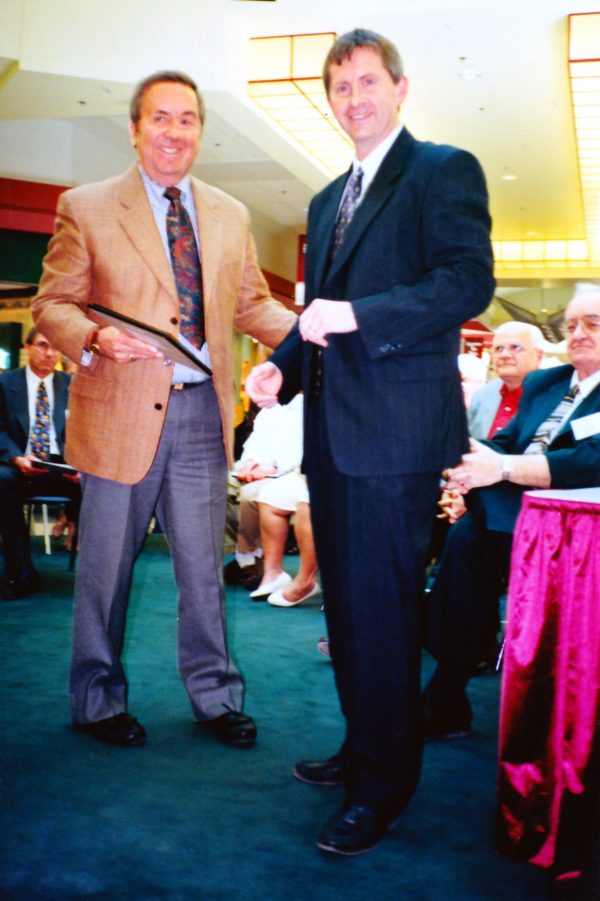
“I read that Goody Rosen had died,” said Menary, “and I knew that Rosen had been a member of that storied 1949 Terrier team. His death signalled to me that soon the other players from that team would be gone. I resolved to interview all the players I could and that became my next book project.”
It was the thrill of a lifetime getting to know the players and coaches. Soon the research spread to the Brantford Red Sox, which were the Terriers’ playoff nemesis that summer. “As a result of this research, Brantford team president Larry Pennell and I became close friends. He was as fine a man as I have ever had the pleasure to know.”
As a result of his sportswriting and his involvement in the broader sports community, Menary got to know many of the athletes and builders of those years. He met and interviewed Gordie Howe and a host of other well-known athletes such as Ben Johnson immediately after the Olympic scandal.
“It was during those early years that I hooked up with Ed Heather and created a list of local athletes for a flashback series. Then, over the next decade, I did research and interviewed those athletes still living, and wrote in-depth feature stories.”
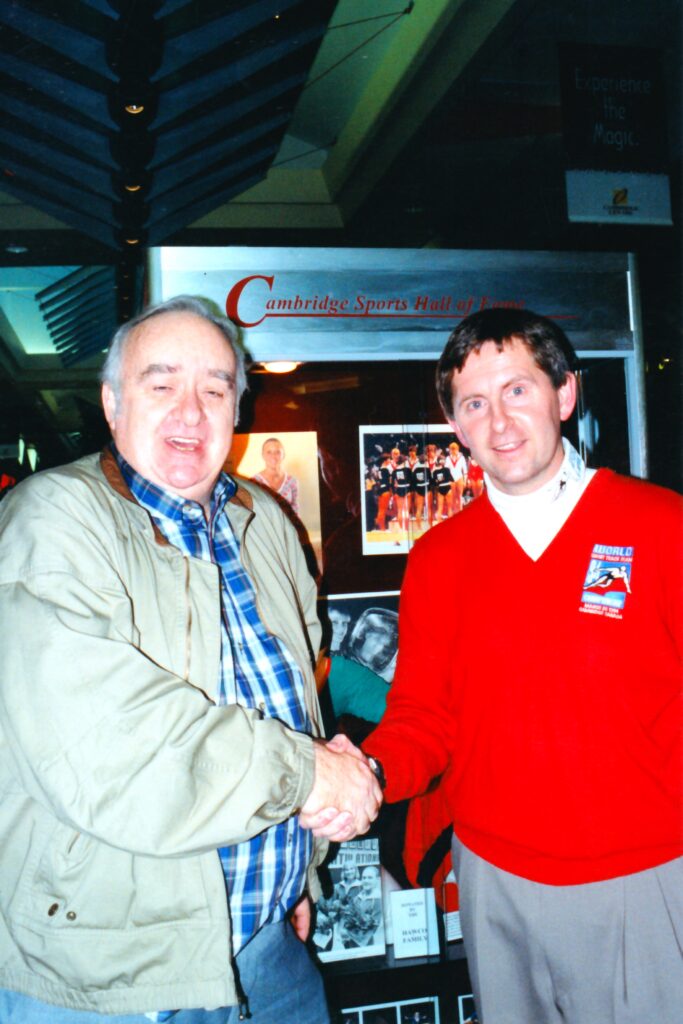
Not all his stories were related to sports figures, but the bulk of them were.
They were almost always local stories though. He was a dedicated ally of local athletes and their accomplishments, taking as much time and effort writing about high school athletes and games as he did about university or professional athletes.
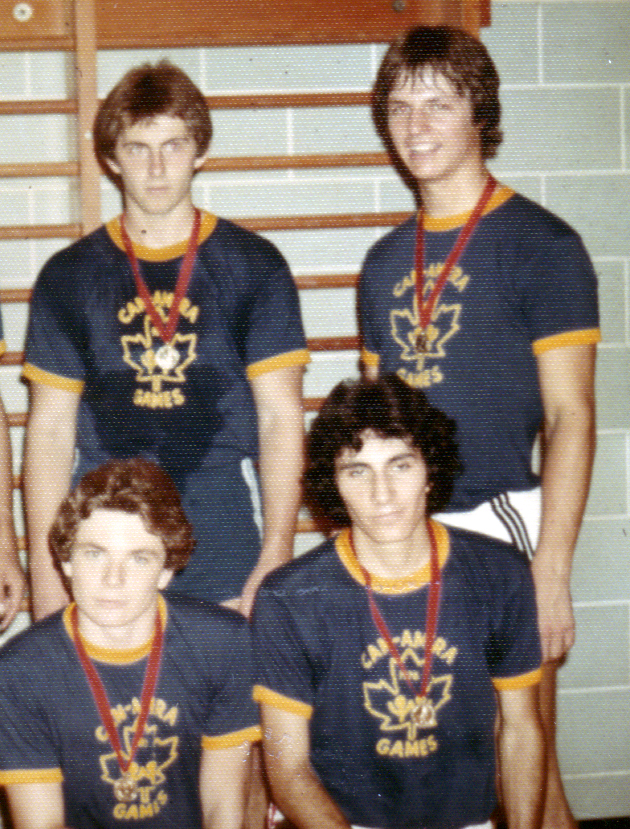
“I always strived to put my best writing into these stories,” he said. “I was often getting unsolicited feedback about how some stories touched people—a few readers reported they had been moved to tears at something I wrote—and this always motivated me to do my best.”
Cambridge and the local community were always at the centre of everything he did.
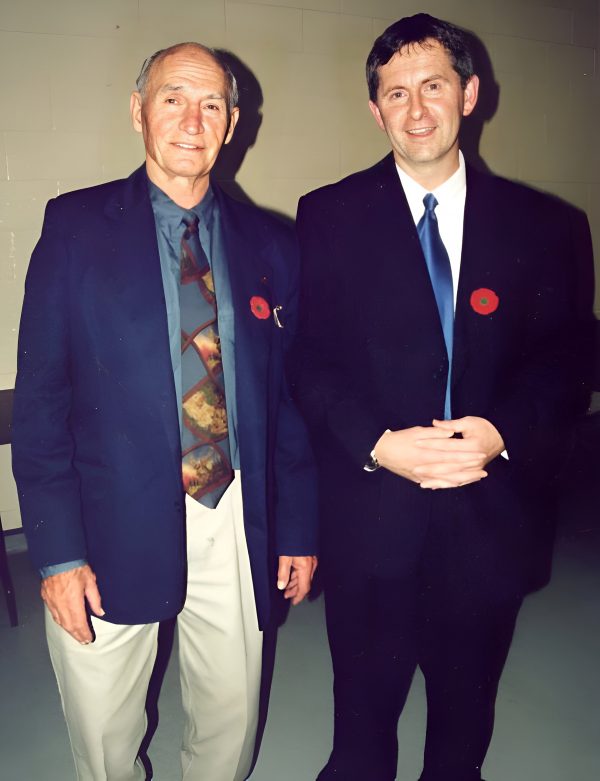
In 1994 Menary served as communications chair for the World Short Track Speed Skating Championships, an event that was hosted by the Canadian Amateur Speed Skating Association and Speed Skating Ontario at the new Hespeler Arena’s Olympic-sized ice surface.
He won a few newspaper awards for his sportswriting and editing and for history stories. Later he would return to school and earn a Masters degree in history from the University of Waterloo.
After writing a feature-length story about local long-track speed skater Kevin Overland setting a world record at the Calgary Olympic Oval, he sent it to Sports Illustrated. Senior writer Michael Farber called him a couple of times to encourage him to become a speed skating correspondent in Canada for the magazine and wanted to put him in touch with an editor in New York. But he had a young family and was by then working on Terrier Town; he never followed up.
What he did do was enlist Al Findlay and Cam Allan, both of whom are now members of the Hall, to help form a committee and begin the Cambridge Sports Hall of Fame. That was 1996. City of Cambridge Commissioner of Community Services, Jim King, promised Menary that if he got a committee together, the city would give them the upper room in Galt Arena Gardens, which was being renovated at the time.

“We were completely absorbed by the project and spent the next few years recruiting committee members and helping to get the Hall off the ground.”
He considers the 50 or so committee members through the years as friends and credits them with sustaining and growing the Hall and keeping it relevant through the years.
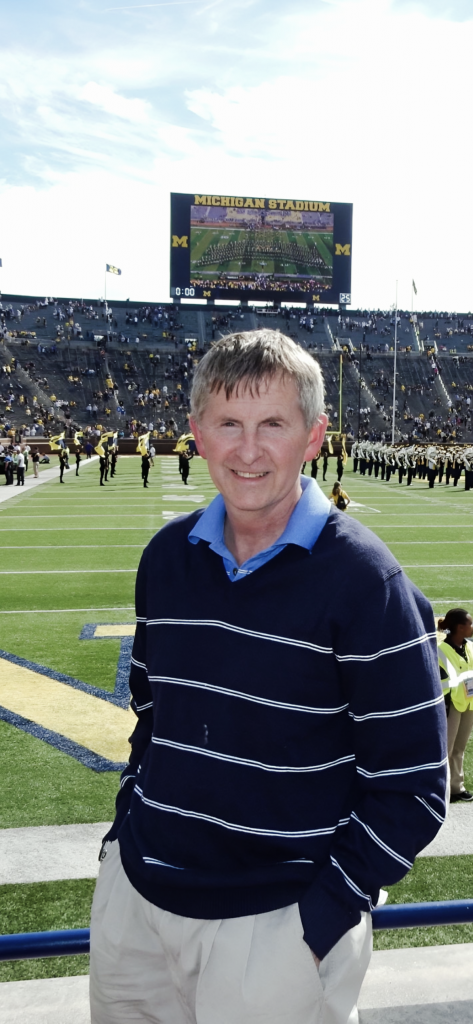
“Those early years with Cam and Al and our first committees were special times because we were building something and we were totally committed to it.”
He continues to devote countless hours to the Hall, but it’s been a passion that has lasted nearly lasted three decades. “It’s been so much fun, and hard work, and I often muse that I might have written more books were it not for the time commitment the Sports Hall takes. But the Hall and working with so many great people over the years has been the great pleasure of my life, in addition to my writing and painting.”
Still, he’s written several books, including Terrier Town, which won Honourable Mention at the Foreword Magazine Book of the Year awards in Chicago in 2004. The winning entry was a newly-published book by the late Mark Twain and American writer Lee Nelson called Huck Finn & Tom Sawyer Among the Indians.
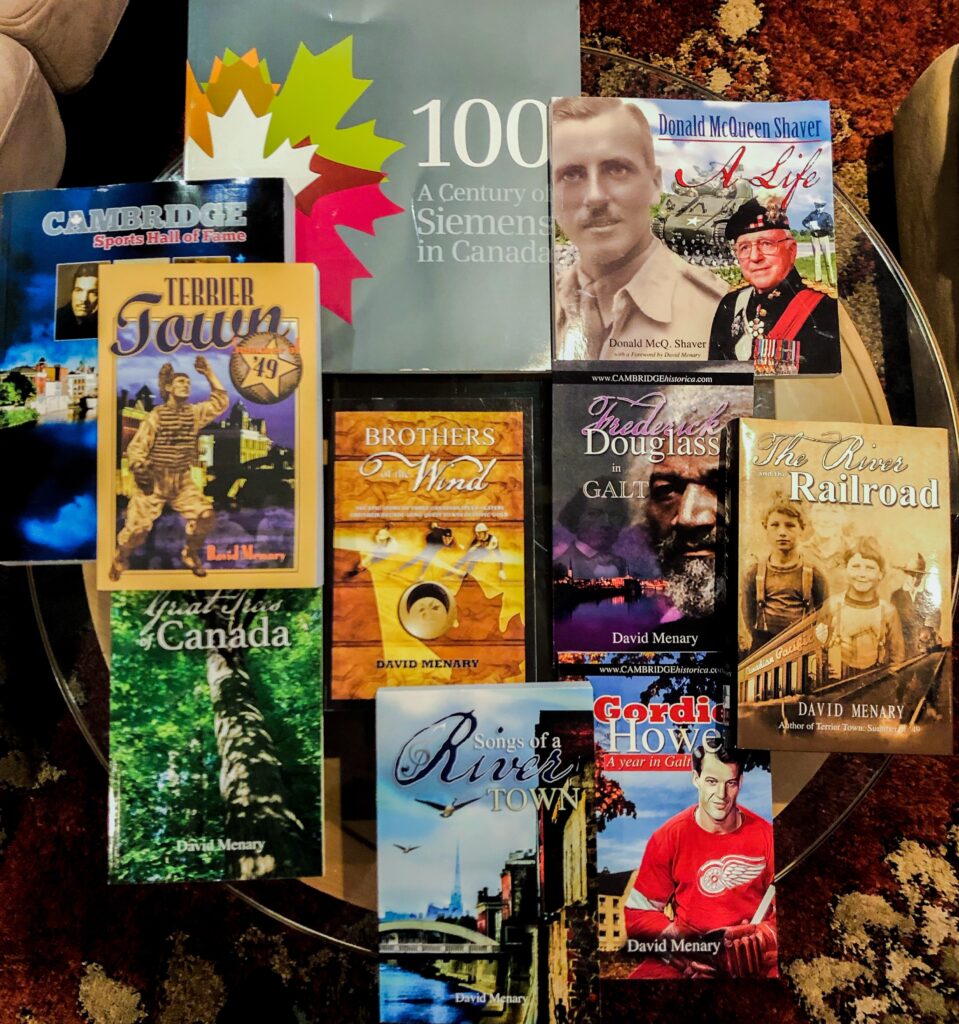
Some of the other books have been the Cambridge Sports Hall of Fame book, the Great Trees of Canada, Gordie Howe: A Year in Galt, The River and the Railroad, Brothers of the Wind, and Frederick Douglass in Galt. He’s hoping to finish his latest book in 2024 about the 100-year history of Galt Arena.
Menary’s contributions have been recognized with a Bernice Adams Award and the Don and Benita Rope Sports Contributor Award.
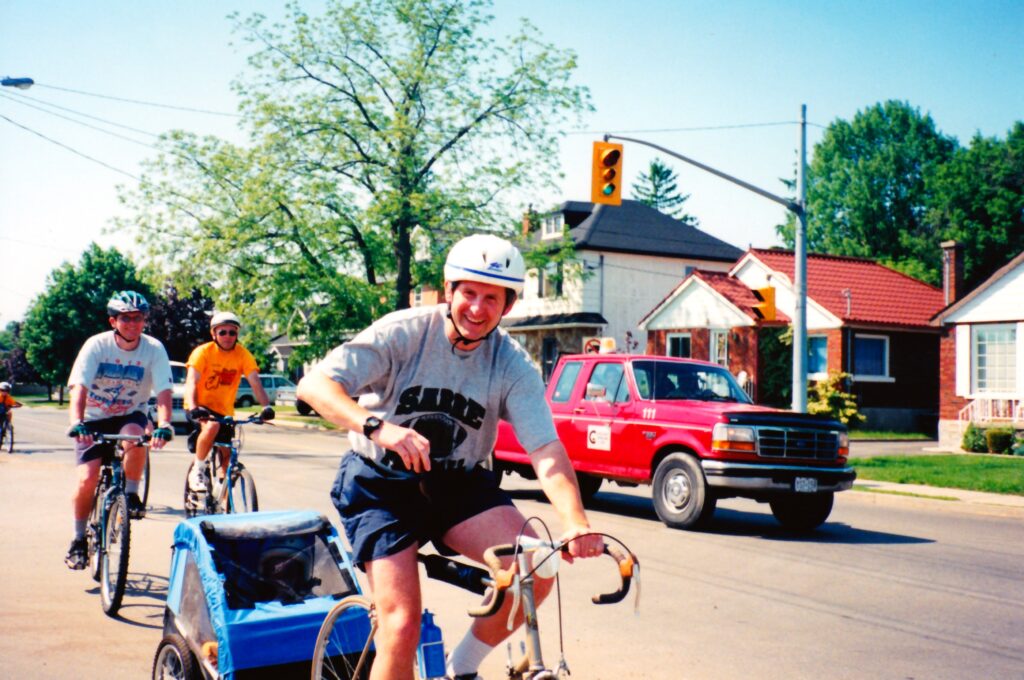
Make a donation today, and support the Cambridge Sports Hall of Fame.
Cambridge Centre Mall
425 Hespeler RoadUnit #6, PO Box 444 Cambridge, Ontario N1R 8J6
General inquiries: info@cambridgeshf.com Archives and Nominations: cshf1@live.com
© 2025 All Rights Reserved.